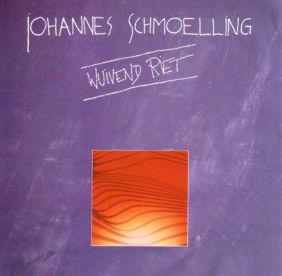| |

|
Johannes Schmoelling
Wuivend Riet- Studio, released August 1986 -
|
Cover |  CD release Germany 1986
Artwork: Hans Schorn & Hans Peter Kuhn
Design: Atelier Fessel |
|
|
|
Tracks | |
|
|
Details | | | | Recording date | 1986 | | Recording site(s) | Riet Studio (Berlin) | | Composer(s) | Johannes Schmoelling | | Musician(s) | Johannes Schmoelling, Hans Bosch | | Producer(s) | Johannes Schmoelling |
|
|
|
Notes | "'Wuivend Riet' comes from the Dutch and means 'wind blown reeds'." |
|
Soon after Johannes Schmoelling had left Tangerine Dream in 1985 he released his first solo album Wuivend Riet. Some of its tracks, especially Zeit, are quite Tangerine Dream-like, though, of course it has nothing in common with the namesake TD composition from 1972. The two-part title track had originally been composed as theatre music for the play "Opus ESP" by Hans Bosch, premiered 1985 in Amsterdam. The play's final scene shows human figures hanging and swaying on super-human sized reeds. |
|
The composition Matjora Is Still Alive may have become one of the best-known tracks by Johannes Schmoelling; it was re-released on six or more V.A. compilations by different record labels. Its title refers to Matjora, a Russian river island. Though it is an old settlement, its inhabitants love their isolated village, because they are deeply rooted to it and feel at home in it. Then the government takes a far-reaching decision: to construct a huge dam. Matjora should be flooded, and the village should be resettled. A Russian movie from 1979/1983 tells the story about this situation. |
|
|
Releases | | | | Germany | - 1986: Erdenklang/Intercord
- LP: IRS 942.160
- 1987: Erdenklang/Intercord
- CD: IRS 971.160
| | Japan | - 1988: Erdenklang/Imagine
- CD: A32C-71
| | USA | - 1987: Lifestyle
- LP: LSR 6007
- CD: LSCD 3107
|
|
|
|
|
 |





